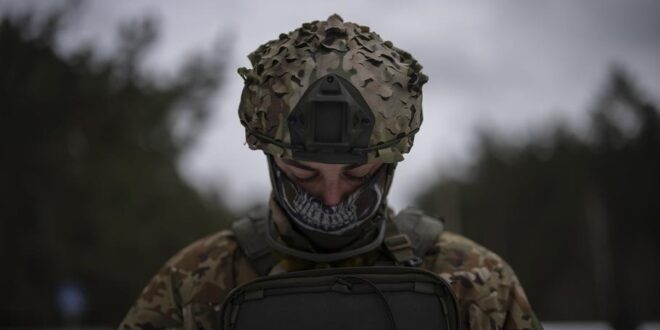The reconnaissance drones fly several times a day from Ukrainian positions deep inside the thick forest that marches across the border into Belarus, a close Russian ally, scouring sky and land for signs of trouble on the other side.
Ukrainian units are monitoring the 1,000-kilometer (650-mile) frontier of marsh and woodland for a possible surprise offensive from the north, a repeat of the unsuccessful Russian thrust toward Kyiv at the start of the war nearly a year ago.
This time the Ukrainians are taking no chances. Since the summer they have been reinforcing defenses, building and expanding trenches and laying mines in the forest ahead of the springtime offensive military officials expect. Residents of villages in the region that were temporarily occupied last year are horrified by the prospect of it all starting again.
“We’re listening out for every small sound and noise. This isn’t a way to live,” said Valentina Matveva, 64, from the village of Ripky. “When you’re in constant fear, that’s not life.”
Concerns of a renewed military push were stirred in January after Russia and Belarus held joint air force drills, one month after a rare visit by Russian President Vladimir Putin to Minsk.
Military experts and Western intelligence have played down the possibility of a renewed northern offensive. The British Defense Ministry tweeted on Jan. 11 that Russian aircraft and existing Russian troops in Belarus, though numerous, are “unlikely to constitute a credible offensive force.”
Belarusian officials attribute the troop deployment along the border to “strategic deterrence” according to local reports. The country’s authoritarian president, Alexander Lukashenko, has insisted he will not send troops to Ukraine.
But Ukrainian commanders are wary, remembering how Russia used Belarus as a launching pad in early 2022.
“We continuously monitor the enemy from the ground and observe the movement of troops, if they are moving, how many troops, and where they are moving,” the area’s army intelligence unit head said during a press tour this week a few kilometers from the border. The officer only identified himself by his first name, Oleksandr, citing security reasons.
Unlike the east with its devastating artillery duels, here in the north it’s largely a war of quadcopters.
Oleksandr said the Belarusians and Russians are “constantly monitoring our guard changes, trying to find our military’s positions.”
At times, Oleksandr’s unit detects enemy reconnaissance drones and shoots them down using anti-drone rifles. Or an enemy drone detects a Ukrainian one and tails it, at which point the Ukrainians try to capture and add it to their stock.
“We got four of their drones this way recently, and they took two of ours,” Oleksandr said.
He says the reconnaissance missions have revealed no sign of worrying activity — yet. “They have a reinforcement section, and the patrol has been strengthened, but we do not observe a significant accumulation of troops from our section,” he said.
Ukraine’s Lt. Gen. Oleksii Pavlyuk, who is responsible for Kyiv province, was quoted in local reports as saying his country was preparing for a possible fresh attack through Belarus. “We’ve created a group on the border with Belarus, which is ready to meet the enemy with dignity,” he was quoted as saying.
Ukrainian officials argue that no one can know how Moscow will move in the coming months, and that a state of alert is necessary along the border.
“The (fortifications) were made to prevent re-infiltration,” said Oleksandr, “Whether it will happen or not, we must always be ready.”
Ukrainian soldiers armed with machine guns stand in five-foot-deep trenches dug into the forest floor and reinforced with planks.
A local villager briskly cycles past. Memories here are still fresh from the temporary occupation when Russian troops attempted to lay siege to the main city of Chernihiv. They withdrew on April 3 as Moscow switched its focus to Ukraine’s eastern provinces.
But despite the Russian-Belarusian drills, there’s also hope.
“The first time they invaded, we didn’t have the weapons and the army (at the border),” said Hanna Pokheelko, 66, from the village of Koluchivka. “But this time we do.”
Attack or no attack, Olena, from the village of Novi Yarylovychi, fears the border situation means she may never see her mother, brother and two sisters living just 3 kilometers (1.8 miles) away in a village inside Belarus.
“I can’t believe they are so close and I can’t see them,” said the 63-year old, who is a Belarusian by birth but married into a Ukrainian family and who didn’t give her full name out of concerns for her family.
 Eurasia Press & News
Eurasia Press & News



